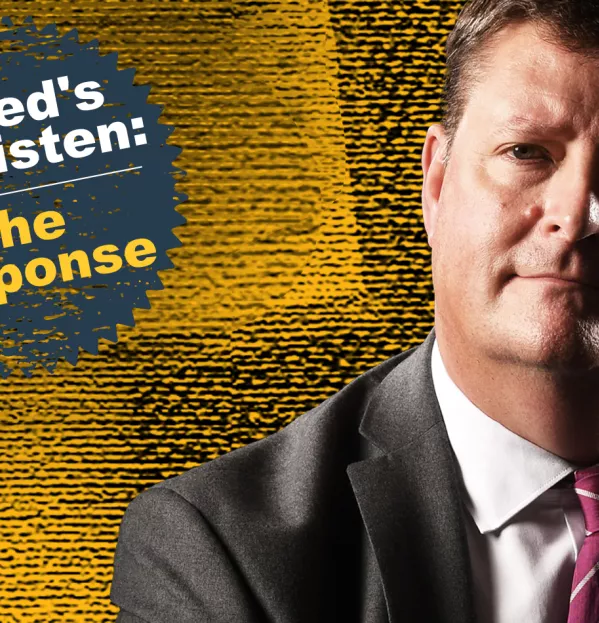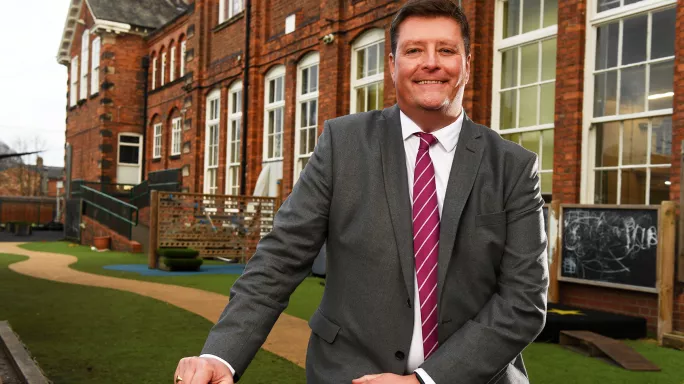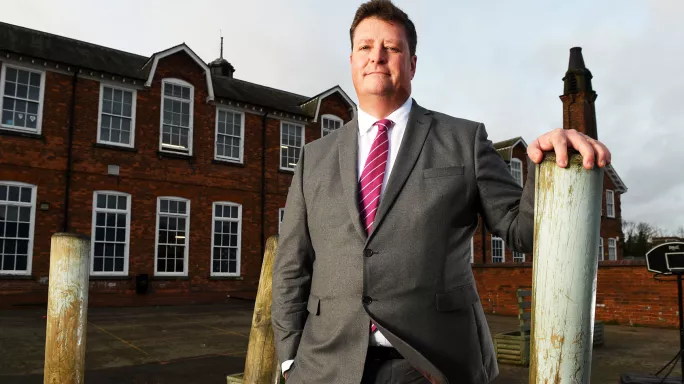Sir Martyn Oliver: We accept the criticism and we’re going to change

“We’ve heard significant challenge from those that we inspect and regulate that we need to reset our relationships - we’re going to accept the criticism and we’re going to make the changes.”
Ofsted chief inspector Sir Martyn Oliver, talking to Tes in a sit-down interview ahead of today’s announcement of a wide-ranging package of reforms, is keen to stress that the inspectorate has listened to - and is now acting on - the feedback it received from 20,000 plus responses in its Big Listen consultation.
“It’s clear people want to see consistency. People want to see a reducing of the pressure and the stress...they welcome accountability, just not unnecessary accountability, not threatening accountability, not accountability that makes them feel anxious and worried,” says Sir Martyn.
That change has begun already with an announcement yesterday by the Department for Education that schools will now not receive single-word overall judgements but instead be inspected on the four existing sub-judgements before a new report card system is introduced.
While this was a change made by the government, not Ofsted itself, Sir Martyn says he had a critical role in helping education secretary Bridget Phillipson make this decision after being tasked to look at the issue by her soon after she took office.
“The government haven’t taken this decision in isolation from Ofsted,” Sir Martyn explained in a press briefing about this change. “The secretary of state, in one of our first conversations, charged me with working out whether this was possible [and] I provided the advice, which she then took. So, of course, I fully support the decision.”
A new Ofsted inspection framework
The decision will have significant repercussions in terms of how Ofsted inspects schools. And so, despite Sir Martyn saying in his application letter for the job last year that “the system does not need a new framework imposed upon it”, Ofsted is planning to consult on a new inspection framework.
“What we heard in the Labour manifesto was the removal of single-word judgements, and we’ve also heard about a report card-style way of working, and I want to make sure that our framework works to both of those two areas. That’s crucial,” he says.

Why, then, did the Big Listen not ask about removing single-word judgements, as some critics noted?
Sir Martyn slightly bristles at this suggestion, pointing out that although Ofsted did not ask directly about this “because that’s not what the policy of the government [was at that time]”, feedback on the issue was gathered by other means.
“I commissioned two independent reports, including on parents and carers...and we’ve heard loud and clear - and this surprised us - that they don’t think a single-word judgement gives them the complexity or the nuance that they’re looking for in reports,” says the chief inspector.
“They want to see more context. They want to see more nuance.”

- Ofsted’s Big Listen response: all you need to know
- Ofsted target drove down quality of inspections
- DfE scraps Ofsted single-word school inspection grades
This data - specifically that only three in 10 professionals and four in 10 parents support single-word judgements - was also cited by the DfE as a justification for turning to report cards.
What this new inspection framework may look like is currently unknown - although Ofsted has specified that it intends to keep “the best of the current approach”. It cites the curriculum focus of inspections as an example of this (though it should be noted that Ofsted did not see the need to retain curriculum units) - but the rest will be open to consultation, beginning immediately.
“From now, from today, we will informally start working with the representative bodies and those with a vested interest, and then by Christmas we would need to go out to formal consultation,” he outlines.
Even with the immediate removal of single-word judgements as part of this shift to a new framework and report cards, school leaders may question exactly how they can currently be inspected under a framework that they know is now considered inadequate itself.
Sir Martyn is adamant, though, that the changes planned do not undermine what currently exists: “Our framework isn’t broken. We’re not talking about everything in the past being bad and something forward is going being a solution.”
However, he says trying to “shoehorn” scorecards and other proposed changes into the existing framework would not be the right approach.
What could inspection report cards include?
Given that report cards are a big part of plans for a new framework, what will they actually look like. Well, at present the government does not have a definitive view. More consultations are planned.
However, Sir Martyn hints at some areas that could be included on the cards, such as attendance, given its importance over the past few years.
Inclusion also seems set to become part of any new report card, with Sir Martyn saying he wants to ensure schools that support a wide range of pupils are recognised for it.
“I can be quite clear now that being inclusive, working with children who’ve got special educational needs, with children who are disadvantaged, whether you’re behind in your learning, whether you’re a young carer...I want to make sure that schools that are doing that difficult work and taking on that context are getting the reward for doing that work,” he says.
“I don’t want a scenario where because of Ofsted any school says, ‘We didn’t take a child because we feared it would hurt our Ofsted inspection.’ I’m not saying that’s ever been the case but that perception can’t exist. That’s just total nonsense.”

Inclusion is something he thinks a scorecard system will be far more effective in highlighting - both good and bad.
“That’s the beauty, isn’t it? Once you don’t reduce it down to a single-word grade, you can have one grade where you could be very high, could have another area where it’s very low. You can have that complexity.”
What exactly the inclusion criteria will look like will go to consultation. Based on the timelines announced by the DfE, it should all come together for the next academic year.
“My absolute plan, and I think the secretary of state’s clear plan, will be to introduce this new report card-style of working for September 2025,” Sir Martyn says.
“That would allow us time to train, pilot and do all of the work that we would need to give some run into schools for September 2025.”
Inspection notification on Mondays
Of the more immediate changes, perhaps the most notable, in terms of its impact on all schools, is that from this year schools will know by Monday afternoon if they are to be inspected.
“I know what it’s like to be a headteacher and you’re in the [inspection] window,” Sir Martyn says. “I had headteachers in the 42 schools [at Outwood Grange] who would have a suit in their car for months, who felt they couldn’t go on visits or conferences. [It was] another moment of unwanted, unnecessary, unwarranted pressure on the system. It puts Ofsted at the front of the leader’s mind, day in, day out - I don’t want that.”
“I know what it’s like to be a headteacher and you’re in the inspection window”
He is keen to add that not only will this change help leaders in the short term, it will also bring more consistency and structure to Ofsted’s work.
“It means inspectors can be in a school on a Tuesday and Wednesday, write up their report on a Thursday, and then Friday becomes the moment where the Ofsted Academy steps in,” he says.
“Because now, instead of doing our world-class training that people always talk about a couple of times a year, I can do that every single Friday [in the academy]. We can have consistency panels, lessons learned, what went well, and drive things to be more consistent.”
The need for a push for consistency is something Sir Martyn says came across loud and clear in the Big Listen. By doing this - and being able to highlight best practice from schools within this work - it can play a role in helping schools, too, he adds.
“The beauty of Ofsted’s work, and especially in a nuanced report card style, is we can find and uncover the very best practice across 22,000 schools, and we can show through a better way of reporting how [schools] could learn from each other and could talk to each other,” he says.
Safeguarding and ‘incomplete inspections’
Another immediate change is around safeguarding: it will not remain a limiting judgement. Instead, schools will be given three months to rectify any issues uncovered during an inspection.
“We will give the school up to three months to resolve that, and we will then come back and complete the inspection - not opening and reinspecting the other areas where we’ve already determined them to be ‘good’ or ‘outstanding’ - just looking at those actions alone.”
This change is a direct result of the death of headteacher Ruth Perry. A safeguarding concern led to her school being given an “inadequate” judgement despite it being “good” or “outstanding” in all other areas.
Sir Martyn is keen to say that this change is not about “lowering standards”. Inspectors will have to be confident that leaders will take action in response to an incomplete inspection - and there will be an obligation on schools to inform parents if such a situation occurs.
“It’s crucial we have the confidence leaders and those responsible will take action, and that will include informing parents immediately that there was an incomplete inspection and the reasons for it are because there are safeguarding concerns,” Sir Martyn explains.
“If the school setting won’t send the letter then I’m afraid we will have to say then, in that case, the inspection is complete and it is ‘inadequate’.”
Sir Martyn says he thought “long and hard” about this but is convinced that it will improve the safety of children as it will get schools to act faster to fix any safeguarding concerns.
“Right now it takes a couple of months for a report to go out…but I want action immediately. So I think this way of working means we can be assured that action takes place immediately.”
He adds that a scenario in which a school is “good” or “outstanding” on each criteria but fails safeguarding has only happened to “one or two schools…if you look at past history”. But he says this change should avoid it happening in the future.
He acknowledges, though, that there are ways that the approach to inspecting safeguarding can be improved. He has “tasked Ofsted” with answering this question: how can it can make it “absolutely clear to providers what it is that we expect when we look at safeguarding?”
Ofsted has outlined that it will make it clearer what inspectors are looking for when they review a school’s single central record, and update its inspection handbook to explain the statutory expectations in the Keeping Children Safe in Education’ guidance.
That should help Ofsted staff, too, given that watchdog is also planning annual safeguarding, attendance and off-rolling reviews - something that will no doubt require a significant increase in capacity among inspectors.
Budget pressures
In its manifesto, Labour promised £45 million for Ofsted reform, doubtless with all these sorts of changes in mind. However, the gloomy financial noises from government make it clear that this money is not a guarantee.
“The chancellor’s really clear that the fiscal situation is tight…I’m not naive enough to think that manifesto commitments can always materialise in exactly the way that they were manifested,” Sir Martyn says.
He hopes, though, that this funding will be provided and he makes a not-so-subtle reference to what might happen if that money is not forthcoming.
“There comes a moment where you are asked to do more for less, and you end up not being able to do more for less. You just do less with less.”
Does this mean, Tes asks, that without the money certain proposals will fall by the wayside? “Of course it would - you’re talking about the sum of money which is nearly a quarter of our entire budget.”
That, then, could be the spanner in the works for all of these grand plans.
All eyes will be on the government spending review in late October when Sir Martyn will likely discover if the scope of his ambition to reform Ofsted, its place in the school system and how it is viewed by teachers and leaders can be achieved.
“I’m not introducing things that I thought, as a headteacher, would have made my life harder,” he says. “I’m trying to produce things which make the accountability acceptable.”
For the latest education news and analysis delivered every weekday morning, sign up for the Tes Daily newsletter
You need a Tes subscription to read this article
Subscribe now to read this article and get other subscriber-only content:
- Unlimited access to all Tes magazine content
- Exclusive subscriber-only stories
- Award-winning email newsletters
Already a subscriber? Log in
You need a subscription to read this article
Subscribe now to read this article and get other subscriber-only content, including:
- Unlimited access to all Tes magazine content
- Exclusive subscriber-only stories
- Award-winning email newsletters
topics in this article



